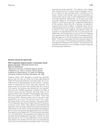 January 2015 in “Indian Journal of Dermatology, Venereology and Leprology”
January 2015 in “Indian Journal of Dermatology, Venereology and Leprology” The document concludes that various skin conditions have specific characteristics and treatments, and highlights the importance of vitamin D in managing these dermatological issues.
18 citations,
January 2016 in “Journal of Clinical Medicine Research” A woman with lupus and severe nerve damage improved with specific treatments.
 2 citations,
August 2023 in “Pharmaceutics”
2 citations,
August 2023 in “Pharmaceutics” New skin disease treatments using TDDS are improving but face challenges like side effects and high costs.
 3 citations,
January 2022 in “Pharmaceutics”
3 citations,
January 2022 in “Pharmaceutics” Nanostructured delivery systems could potentially improve hair loss treatment by targeting drugs to hair follicles, reducing side effects and dosage, but the best size, charge, and materials for these systems need further investigation.
August 2024 in “Nutrients” Probiotics help reduce hair loss and increase hair growth in people with androgenic alopecia.
 184 citations,
February 2015 in “EBioMedicine”
184 citations,
February 2015 in “EBioMedicine” A patient with Alopecia Areata had complete hair regrowth after using the drug baricitinib.
 22 citations,
November 2018 in “Brazilian Journal of Pharmaceutical Sciences”
22 citations,
November 2018 in “Brazilian Journal of Pharmaceutical Sciences” New physical methods like electrical currents, ultrasound, and microneedles show promise for improving drug delivery through the skin.
 January 2024 in “Diabetes & metabolism journal”
January 2024 in “Diabetes & metabolism journal” Disrupting natural body clocks increases the risk of developing type 2 diabetes.
 11 citations,
December 2018 in “Assay and Drug Development Technologies”
11 citations,
December 2018 in “Assay and Drug Development Technologies” Natural herbal compounds might treat certain medical conditions by reducing DHT levels, but more research is needed to confirm their effectiveness and safety.
 November 2023 in “Frontiers in cell and developmental biology”
November 2023 in “Frontiers in cell and developmental biology” Hair aging is caused by stress, hormones, inflammation, and DNA damage affecting hair growth and color.
 February 2014 in “Medicine - Programa De Formación Médica Continuada Acreditado”
February 2014 in “Medicine - Programa De Formación Médica Continuada Acreditado” The document concludes that non-scarring alopecias can be reversed, but scarring alopecias cause permanent hair loss.
 September 2004 in “Experimental dermatology”
September 2004 in “Experimental dermatology” Melatonin directly affects mouse hair follicles and may influence hair growth.
 October 2020 in “Revista médica sinergía/Revista médica sinergia”
October 2020 in “Revista médica sinergía/Revista médica sinergia” Alopecia areata is a complex condition causing hair loss, linked to genetics and immune system issues, and may be related to other autoimmune diseases; treatments vary in effectiveness.
18 citations,
July 1998 in “Pediatric Dermatology” Monthly oral corticosteroid pulses effectively treat widespread alopecia areata in young patients.
48 citations,
July 1998 in “Pediatric Dermatology” Monthly oral corticosteroid pulses effectively treat widespread alopecia areata in young patients.
 June 2023 in “British journal of dermatology/British journal of dermatology, Supplement”
June 2023 in “British journal of dermatology/British journal of dermatology, Supplement” Congenital alopecia areata may have genetic links and topical corticosteroids are an effective treatment.
 183 citations,
January 2018 in “Cosmetics”
183 citations,
January 2018 in “Cosmetics” Essential oils in cosmetics can offer benefits but may cause allergies and should be used carefully.
7 citations,
January 2014 in “International Journal of Trichology” Primary idiopathic pseudopelade of Brocq causes gradual, scarring hair loss with no effective treatment.
 January 2022 in “Clinical dermatology open access journal”
January 2022 in “Clinical dermatology open access journal” Early-stage Alopecia Areata was effectively treated in less than six months.
 4 citations,
March 2023 in “Journal of medical case reports”
4 citations,
March 2023 in “Journal of medical case reports” Taking too much vitamin E caused a young man's blood clotting problems, which improved after he stopped the vitamin E and got treatment.

A woman in Sri Lanka was diagnosed with lupus after presenting with protein loss from the gut and other symptoms.
65 citations,
September 1999 in “The Journal of Dermatology” Twice-weekly 5 mg dexamethasone can effectively treat extensive alopecia areata in many patients.
 5 citations,
March 2011 in “Journal of pediatric health care”
5 citations,
March 2011 in “Journal of pediatric health care” The girl with autoimmune hair loss might regrow hair within a year, and treatments can help but not prevent recurrence; dermatologist referral and corticosteroids are recommended.
2 citations,
October 2022 in “Rheumato” A young woman with severe symptoms was diagnosed with SLE and improved significantly after treatment.
6 citations,
January 2007 in “Journal of cutaneous medicine and surgery” The article concludes that careful examination is crucial for the timely diagnosis and treatment of a rare scalp condition in an Aboriginal Canadian teenager.
 1 citations,
January 2023 in “Nutrients”
1 citations,
January 2023 in “Nutrients” Drinking lots of sugary drinks may increase the risk of hair loss in young men.
22 citations,
August 2006 in “Journal of the European Academy of Dermatology and Venereology” Twice-weekly 5 mg betamethasone helps hair regrowth in alopecia areata.
5 citations,
October 2018 in “Journal of Cosmetic Dermatology” Oral pulse steroids reduce TNF-α levels, improving alopecia areata.
 8 citations,
January 2003 in “Pharmacotherapy: The Journal of Human Pharmacology and Drug Therapy”
8 citations,
January 2003 in “Pharmacotherapy: The Journal of Human Pharmacology and Drug Therapy” Chemotherapy may cause recurring hair loss due to an autoimmune response.
 4 citations,
August 2013 in “Case reports in dermatology”
4 citations,
August 2013 in “Case reports in dermatology” A patient with total hair loss developed vitiligo after using a treatment called DCP.



















